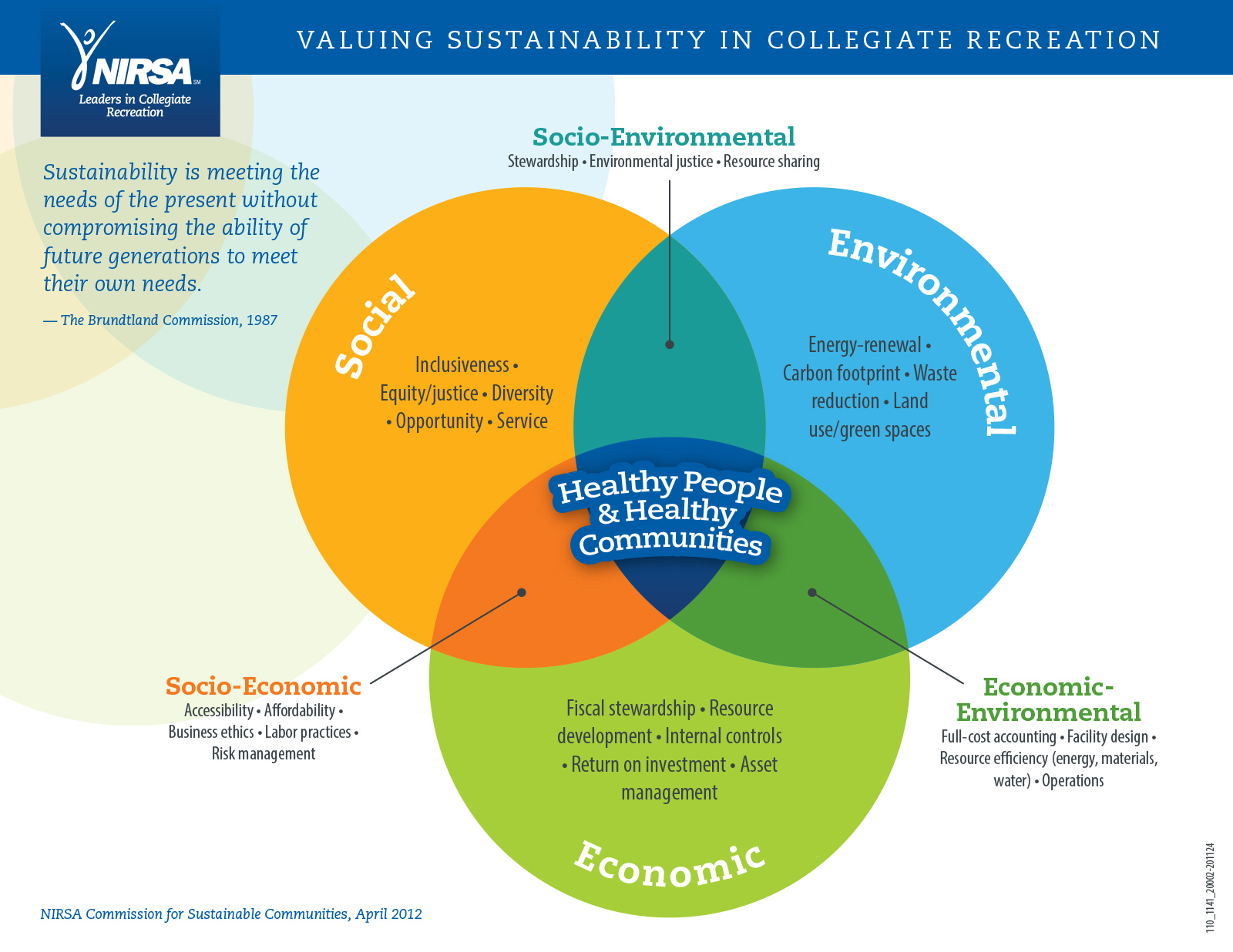NIRSA’s Strategic Values
The Values of Campus Recreation
Out of the strategic planning process that started in June 2011, several strategic values emerged and, after significant discussion, the NIRSA Board adopted six of them during the 2012 Annual Meeting in Tampa, Florida:
Equity, Diversity & Inclusion • Global Perspective • Health & Wellbeing • Leadership • Service • Sustainable Communities
Equity, Diversity, and Inclusion
The higher education environment is being changed by the shifting dynamics of its students and its workforce.
Students and employees are becoming more diverse on a broad range of dimensions including gender, sex, sexual orientation, language, age, ability status, national origin, religion, socio-economic status, as well as race, ethnicity, and heritage. Those who manage programs and services, as well as those who help to develop the talents of students and the workforce, need to be prepared to address the environmental factors that influence performance and affect overall wellbeing.
Global Perspective
Higher education and collegiate recreation have been impacted by a variety of global influences.
Whether serving non-US born students on campus, providing sport opportunities overseas, or the expansion of higher education and collegiate recreation in other parts of the world, a global perspective is necessary to operate in today’s environment.
The NIRSA Board has directed the team at NIRSA Headquarters to do some initial research and data collection about global perspectives on behalf of NIRSA. Based on that data, options for understanding the impacts of a global society on collegiate recreation will be considered.
Health & Wellbeing
The severe impact of rising health care costs has created a new emphasis on prevention and holistic employee wellness.
Colleges and universities have an opportunity to impact students, employees, and the surrounding community with wellness initiatives. Although some campuses have well established wellness programs to serve this need, wellness is an emerging service for many institutions. Campus recreation professionals have an enormous opportunity to provide major components in the health and wellbeing of our campus communities.
Wellness is a collaborative effort transcending many departments across an institution’s campus. Recreation professionals can serve as relationship builders and catalysts for stimulating robust discussions to develop and improve workplace wellness practices.
By recognizing the connectedness of physical health to brain health and productivity, recreation professionals are positioned to have a strong presence in campus wellness initiatives.
Leadership
An ever changing world and higher education landscape have made leadership skills more critical than ever.
The changing demographics of campus communities and the nuances of each generation continue to challenge those who lead and those who aspire to lead. Higher education faces an unprecedented period of accelerated change that is driven by shifts in funding models and demands for greater accountability.
To respond effectively to the complex educational, social, and economic concerns of society, higher education must develop leaders with the competence to meet the challenges of a constantly changing environment, the ability to think strategically, and a penchant to act collaboratively.
Service
NIRSA embodies the value of service through a variety of volunteer and civic opportunities.
As a strategic value, the NIRSA Board will engage the NIRSA Foundation in discussion at the 2012 Summer Leadership Meetings about ways to enhance service opportunities and service learning into programming and opportunities.
Sustainable Communities
Today, there are more than 18 million students in colleges and universities in the United States alone, and if they graduate with the skills to help societies develop more sustainably, higher education will have indeed played a key role in leading our communities in a new direction.
Thus, in order to create conditions that will ensure a more sustainable future, higher education will have to provide college and university graduates with the skills, background, knowledge, and habits of mind that will prepare them to meet the challenges presented by the future.
There are many reasons why collegiate recreation should play a critical and active role in these efforts. Students are engaged in sustainability at a greater degree than ever before. They are seeking campus partners to advance their efforts and recreational sports programs have always been open to such collaborations. When considering the environmental, economic, and social implications, these relationships and the social and political capital we gain are critical to our long term success. Sustainable enterprises such as recreational sports and higher education as a whole can only be attained through the combined efforts of all. As a member of that society, campus recreation has an institutional, if not a social responsibility to be engaged in this endeavor.
Talk to us!
For more information about the strategic values, please contact any member of the NIRSA Board of Directors.


